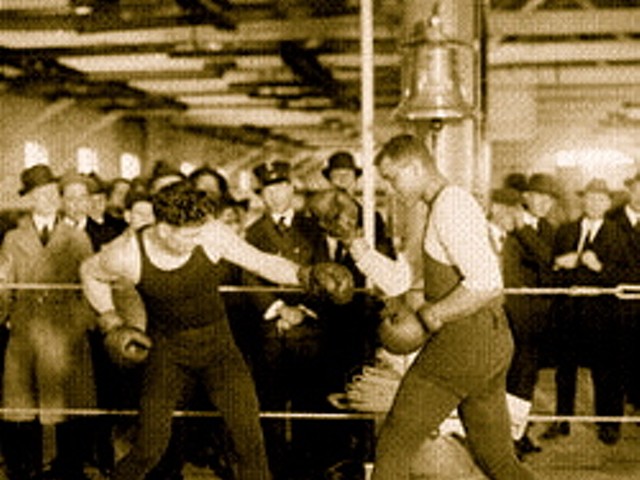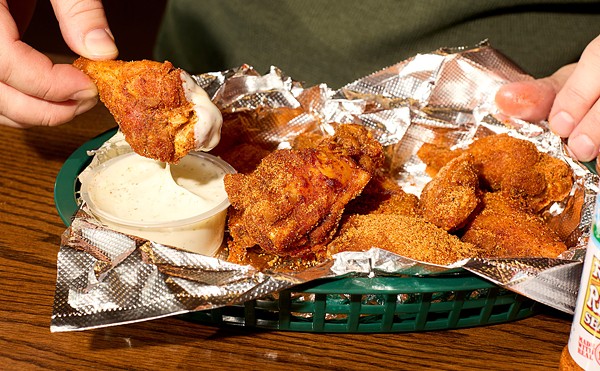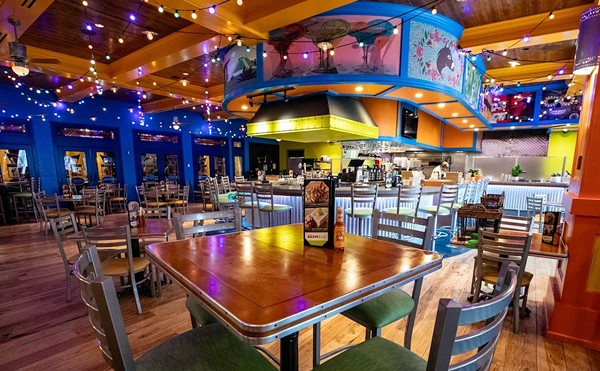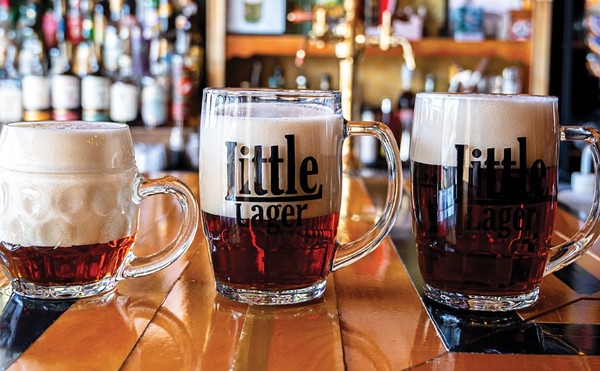St. Louis lost a coffee icon on March 16 when "Java Joe" Charleville passed away at 97. Up until a few weeks before his death, Charleville was still delivering Chauvin Coffee Company beans to a few of the several dozen coffee shops that buy them from the south-side importer.
"He used to wheel the beans in on the dolly himself," recalls Patrick Liberto, the owner of Meshuggah Café. "I remember he always used to park about a block past the shop and always said, 'Overshot it again.' I couldn't believe a guy his age hauling that weight by himself."
"His eyesight wasn't what it used to be, so his wife, Marge, did the driving," says Verner Earls, director of sales and marketing for Chauvin, "but I still used to ask him directions. He knew where everything was in town, and he also knew what used to be there 70, 80 years ago."
It's no surprise; before Charleville was running last-minute refill deliveries for Chauvin, he owned it, and before that, he owned Rose Coffee Company. All in all, his career spanned 80 years. "He used to tell me about going down to the riverfront to unload the beans that came off the barges," says Earls. "He loaded the beans off the truck and got paid $14 a week — but his dad charged him seven bucks a week room and board, so I guess that's where his work ethic came from."
The coffee business was a crowded one in St. Louis in the early part of the century. It made sense to roast here; beans came primarily from South and Central America, entered the States in New Orleans and shot due north on the Mississippi to be roasted and distributed by one of at least a few dozen roasters. Joe himself estimated (and the Chauvin website maintains) that there were 75 roasters active before the Depression. It's hard to get a precise count. A Greater St. Louis Magazine article from 1920 puts the number of roasters and distributors at an even twenty, but Rose Coffee Company — which Charleville bought from his stepfather Isaac Rose and held until he sold it in 1977 — fails to appear in their list, as do Old Judge, Manhattan and countless other roasters that anchored the coffee business. What is clear is that many of the companies — Forbes Bros., Hanley & Kinsella, Nash-Smith, Biston — are long gone or have been abandoned, absorbed or crushed by national competitors. It's a typical story of St. Louis industry: It really was bigger in the past, but it's hard to determine by how much.
Manhattan Coffee — yeah, that was a St. Louis company — was eventually purchased by its top salesman, the legendary Dana Brown. Brown sold Manhattan to Stamford, Connecticut's Unilac, itself a subsidiary of Nestlé, albeit with a stunningly mid-century corporate name, redolent of the vacuum sealing and automated processing that would "improve" coffee over succeeding decades. Brown also maintained the Safari brand, whose red coffee cans depicted the African animals — zebras, lions, elephants — that Brown liked to shoot went he went on, well, safari. That was the thing about coffee men: They were adventurers of the old mold. Charleville was a roaster and a businessman but also a pilot who flew himself to Guatemala to inspect the fields.
Like the wild game on Safari coffee cans, local roasters eventually tilted toward extinction, their plight not unlike a corner bakery's fight against Wonder bread. In 1977, Charleville told St. Louis Commerce Magazine that "the coffee business is a dying industry. The industry is being taken over by the giants." By that point, Charleville estimated that 90 percent of the business was done by 10 percent of the roasters.
It wasn't just industry growth; it was also shrinking demand: In 1946, Americans drank on average 45 gallons of coffee a year — a figure that dropped by half in the late '70s. St. Louis saw its brewing industry decimated due to Prohibition — from 27 consolidated breweries, plus majors and independents besides before, to just one after. Demand for coffee, though, evaporated on its own, and in 1977 Charleville sold Rose, the family business since 1900, to Ronnoco — a giant, but a local giant.
Another fact about Charleville's piloting skills: He crashed his first plane, walked away from the wreck and bought a new one. He couldn't quit. Maybe it's no surprise that, seven years after Charleville sold to Ronnoco, in 1984, Joe and his son Dave opened Chauvin. Dave, who passed away in 2006, brought to Joe's business experience what would be the future for coffee: diversity, craft roasting and a whole host of preparation techniques unknown (or rather, unused) in the postwar java heyday.
Another of Charleville's sons, Tom, started Thomas Coffee the same year. Thomas Coffee and Chauvin shared space on Boyle Avenue until 2000, when Chauvin moved to its current building at 4160 Meramec Street in south St. Louis. Charleville's grandson Mike is Chauvin's roastmaster, and Joe's daughter-in-law, Bonnie Charleville, is the owner and president. Under Tom's control, Thomas Coffee supplied restaurants and, later, grocery stores. At Chauvin, Joe and Dave supplied wholesale beans to coffee shops and — well, everyone else. "We serve thirty states right now," Earls says.
The American coffee renaissance is, at bare minimum, twenty years old. The '90s saw an upswing in java consumption that ran alongside the exploding information age (maybe you've seen the programming language named after it), the same way the stimulant fueled the the industrial age in times past. And the biggest return to form is local roasting taking the reins from international supercorporations, as the upswing in public demand isn't just for caffeine but quality.
Mike Charleville still sees changes after twenty years of roasting.
"The thing is, even five or six years ago, people were still getting much more educated about coffee, the quality of beans, the differences in roasting styles," he says. It's a trend Earls sees happening even earlier, although he credits a little surprising source. "Starbucks actually did a very good job on educating the public about good coffee," says Earls. He can't resist a dig, though: "Now, we roast our beans, and they burn theirs, but at least they got people in the right direction."
At the beginning of Charleville's career, variety wasn't an option.
"The thing is, Joe was probably only dealing with about three to five different kinds of beans," Earls says. "That's just what was available." Today, the business in St. Louis has reversed: Instead of dozens of companies roasting a few kinds of beans and competing with each other — "Cutthroat doesn't begin to describe it," remembers Tom Charleville — the market instead offers beans imported from Yemen to Indonesia, a wider variety of quality roasts and very few competitors. Names like Blanke and Forbes and Biston have vanished, replaced with Goshen and Kaldi's and Chauvin and Mississippi Mud. How many competitors? "There's really about four of us, give or take," says Earls.
In 2011, the market is more congenial than cutthroat, Earls says, because everyone in the area has pretty much found their niche. "I can't imagine what it was like in Joe's day," he says. (Tom, who rode with his father from the time he was young hauling bags and repairing equipment, remembers: "'You don't sell any coffee out of a desk,' he always told me.")
Since Charleville's time, technique has sharpened. Brewing has changed from the massive steel samovars to one-cup brew baskets. Owing to weather irregularities, political turmoil (prices for Yemen mocha are way up) and commodities trading, the beans are themselves getting pricier. "We got stung a little" in the recent crash, Mike says, "but not bad. There's a lot of things people are willing to give up, but this isn't one of them."
After all, Mike says, "luckily there's much better coffee to drink today then there was back then." One the labels on the packing table at Chauvin is "Joe's Special Blend," a medium roast with a clean finish. Did the old man design it himself?
"Nope," says Earls, "that was Mike. But it was Joe's favorite. And actually, it's our most popular."





